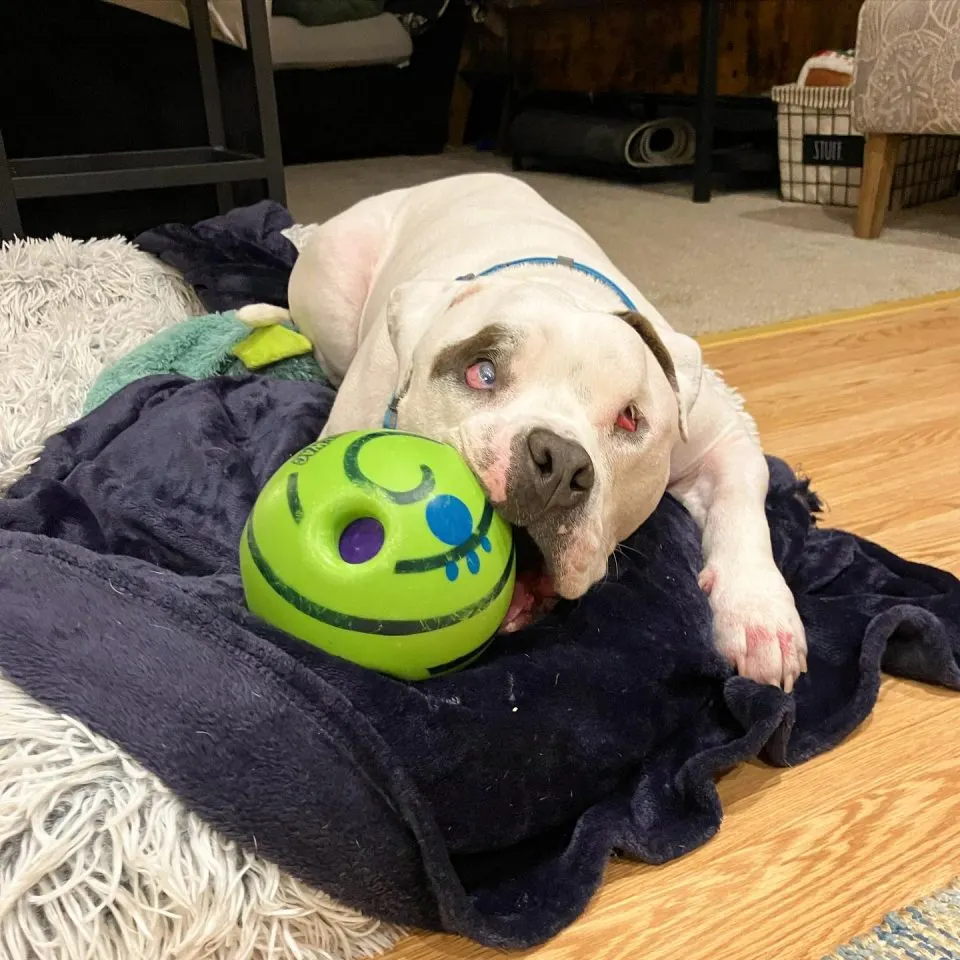It’s not too uncommon for dogs to be born with some form of disability. When it happens, it’s up to the owners to help the pup and the mom live with this as painlessly as possible.
However, that is not the case for most people. A lot of them can’t afford to pay for necessary medications for disabled dogs, or else they simply don’t want to deal with it.
In this story, we will talk about a small puppy who was almost euthanized because his owner demanded it.
A Sad Start To Life

When Bing Bong was first born, he had a lot of difficulties because he was blind. His mom kept attacking him and his owner thought it would be merciful to euthanize him.
These attacks are not uncommon for the species, as many mothers will try to attack their disabled babies to prevent them from further suffering.
When the man took the dog to his local veterinarian, he asked him to euthanize the pup, to which he said, no.
The alternative was that the vet would take the puppy to his home and find some help for him, away from his mother. The man agreed and let it go.
The vet proceeded with his idea, and he called a woman named Kim and asked her if she was willing to take Bing Bong in.
She said ‘yes’ immediately and the blind pup was in her care in no time.
A New Bright Beginning

Because he was so young and small, he had to be taken care of around the clock. His new family made sure he had everything he needed to grow and be happy.
As time went on, Bing Bong (who was named by a toddler) started developing into a beautiful and playful dog.
He started making friends with the other dogs in the house and is just enjoying his life, despite the hardships he had to endure.
Because he was blind, his human mom had to use her voice a lot to help him move around because he only understood his environment that way.
While they are uncertain if he is completely blind or not, they have found ways to adapt to his disability.
Living His Best Life

Despite all of this, it’s clear that Bing Bong has found a loving family who will do absolutely anything to make him feel happy and content in life.
If you want to follow his story, you can go to his Instagram page for regular updates on his life.
Lately, when it’s raining, he has shown fondness for a green ball, and he plays with it excessively.
The family says he is rarely seen without his favourite toy and doesn’t like to give it to anyone else.

Another activity that he enjoys is curling up in a blanket and taking long naps with his other dog siblings. He is just the happiest dog in the world.
It’s a truly beautiful thing when your faith in humanity is restored by people like Kim and the veterinarian who refused to just give up on the poor puppy.
It’s thanks to them that he now gets to enjoy the beauties of life and go on many amazing adventures.
If your furry friend can’t seem to stop scratching, you’re not alone. It’s frustrating to see your dog uncomfortable and constantly itching. From rolling around in the grass to dealing with pesky pests, there could be various reasons why your pup is feeling itchy. As a seasoned dog trainer, I’ve seen this issue pop up time and time again. Understanding the root cause of your dog’s itchiness is the first step towards finding relief for your four-legged companion. Let’s unravel the mystery behind why your dog is so itchy and explore ways to help them feel more comfortable.
Understanding Your Dog’s Itchy Skin
Common Causes of Itchiness in Dogs
If your furry friend is constantly scratching, there are several common reasons for this itchiness. Allergies, fleas, ticks, dry skin, mites, or even infections could be the culprits. Understanding these potential triggers is crucial to finding the right solution for your dog’s comfort.
How to Identify the Source of Itching
To pinpoint the source of your dog’s itching, start by examining their skin and fur for any signs of pests, redness, or inflammation. Keep an eye out for unusual behavior or environmental factors that may be causing the itchiness. Consulting with your vet can also help narrow down the specific cause and determine the best course of action to ease your pet’s discomfort.
Allergies and Your Canine Companion
Types of Allergies in Dogs
When it comes to your furry friend, allergies can be a real nuisance. Dogs can suffer from different types of allergies, with the most common ones being food allergies, environmental allergies, and flea allergies. Food allergies can result from specific ingredients in your dog’s diet, while environmental allergies are triggered by things like pollen, mold, or dust. Flea allergies, on the other hand, occur when your dog is sensitive to flea saliva. Identifying the type of allergy your dog has is crucial in managing their symptoms effectively.
Managing Canine Allergies
Managing your dog’s allergies involves a combination of strategies to keep them comfortable and itch-free. One key approach is to eliminate the allergen if possible. For food allergies, this means switching to a hypoallergenic diet. Environmental allergies may require minimizing exposure to triggers like pollen by keeping your dog indoors during high pollen days. Regular flea prevention can help control flea allergies. Additionally, your vet may recommend medications like antihistamines or steroids to alleviate your dog’s symptoms. By working closely with your vet and being proactive, you can help your canine companion lead a happier, itch-free life.
External Parasites and Skin Irritation
External Parasites and Skin Irritation
If your dog is constantly scratching and itching, it could be due to external parasites. These tiny pests can irritate your dog’s skin and cause discomfort. Let’s look at two common culprits:
Fleas: The Itchy Culprit
Fleas are a common cause of itching in dogs. These tiny parasites feed on your dog’s blood and leave itchy bites behind. If you notice your dog scratching excessively, check for signs of fleas like small dark specks (flea dirt) in the fur. Flea prevention is key to keeping your dog itch-free.
Mites and Ticks: Tiny Pests, Big Problems
Mites and ticks are other external parasites that can wreak havoc on your dog’s skin. Mites burrow into the skin, causing irritation and hair loss, while ticks latch onto the skin, feeding on blood. Regularly checking your dog for ticks and ensuring proper mite prevention can help alleviate itching and discomfort.
By being proactive in preventing and treating external parasites, you can help your furry friend lead a comfortable and itch-free life. Regular grooming, using flea and tick preventatives, and consulting with your vet are crucial steps in managing skin irritation caused by these pesky critters.
Skin Conditions and Diseases
Canine Atopic Dermatitis
If your dog’s constantly scratching, it could be due to Canine Atopic Dermatitis, an allergic skin disease. Dogs with this condition may itch all over, especially their feet, ears, and armpits. It’s often caused by allergens like pollen or mold. Your vet can help diagnose this and recommend a treatment plan, which may include medications or special shampoos.
Yeast Infections and Their Itch Factor
Yeast infections can make your dog itch like crazy, leading to discomfort. These infections often occur in warm, moist areas like the ears or skin folds. Signs include redness, odor, and greasy skin. Your vet can confirm a yeast infection through tests and suggest treatments like medicated baths or oral medications to relieve the itchiness.
Diet and Nutrition: The Role They Play in Skin Health
Food Allergies and Sensitivities
If your dog is constantly itching, it could be due to food allergies or sensitivities. Just like humans, dogs can develop allergic reactions to certain foods, leading to skin issues. Ingredients like beef, chicken, dairy, wheat, and soy are common culprits. To address this, you may need to switch your dog to a hypoallergenic or limited ingredient diet. Consult your vet to determine the best course of action.
Essential Nutrients for Healthy Skin
Your dog’s skin health is greatly influenced by the nutrients in their diet. Omega-3 fatty acids, found in fish oil, can help reduce inflammation and improve skin condition. Additionally, vitamins E and A play vital roles in maintaining healthy skin. Ensuring your dog’s diet is well-balanced and contains these essential nutrients can promote overall skin health and reduce itching. Consider incorporating supplements under the guidance of your vet to support your dog’s skin well-being.
Remedies and Treatments for Itchy Dogs
Veterinary Solutions for Itchy Skin
If your dog’s itching persists, seeking professional help from a veterinarian is crucial. Vets can accurately diagnose the root cause of your dog’s itchiness, whether it’s due to allergies, parasites, or skin conditions. They may recommend prescription medications, such as antihistamines, steroids, or medicated shampoos, to alleviate the itching and treat the underlying issue effectively.
Home Remedies to Alleviate Discomfort
In addition to veterinary care, there are some home remedies you can try to provide relief for your itchy dog. Oatmeal baths can soothe irritated skin, while coconut oil can help moisturize dry and itchy areas. Regular grooming to remove loose fur and debris can also prevent further irritation. Additionally, ensuring your dog’s environment is clean and free of potential allergens can contribute to reducing itchiness.
Preventing Itchiness in Dogs
Regular Grooming and Care
To prevent itchiness in your dog, regular grooming and care are essential. Brushing your dog’s coat helps remove dirt, allergens, and loose fur that could contribute to itching. It also stimulates the skin and distributes natural oils, keeping the skin healthy and moisturized. Trim your dog’s nails to prevent scratching and skin irritation. Check for any irritations, lumps, or parasites during grooming sessions to address them promptly.
Environmental Management for Allergy Prevention
Creating an allergen-free environment is crucial in preventing itchiness in dogs with allergies. Regularly clean your home, especially the areas where your dog spends time, to reduce dust, pollen, and other potential triggers. Wash your dog’s bedding frequently in hot water to eliminate allergens. Consider using air purifiers to maintain clean indoor air quality. Consult with your vet to identify specific allergens affecting your dog and take necessary precautions to minimize exposure.
Conclusion
That’s a wrap on why your furry friend might be feeling extra itchy lately. Remember, it could be allergies, fleas, dry skin, or even pesky mites causing the discomfort. Checking with your vet is key to getting to the bottom of it. Keep an eye out for any signs of irritation on their skin and fur, and don’t hesitate to seek professional advice. With a bit of care, attention, and maybe some vet-recommended treatments, you’ll have your pup feeling itch-free in no time.
Frequently Asked Questions
What are common causes of excessive scratching and itching in dogs?
Common causes include allergies, fleas, ticks, dry skin, mites, and infections. Identifying the root cause is crucial for relief.
How can external parasites like fleas, mites, and ticks affect a dog’s skin?
They can cause skin irritation and discomfort. Regular grooming, preventatives, and vet consultation are key for prevention.
What specific skin conditions or diseases can cause itching in dogs?
Conditions like Canine Atopic Dermatitis and yeast infections can lead to itching and scratching in dogs.
How does diet and nutrition impact a dog’s skin health?
Food allergies, sensitivities, and essential nutrients like Omega-3 fatty acids play a vital role in maintaining healthy skin for dogs.
What remedies and treatments are available for itchy dogs?
Veterinary consultation is crucial for accurate diagnosis. Options include antihistamines, steroids, medicated shampoos, and home remedies like oatmeal baths and coconut oil.
[no_toc]

Hey there, I’m Janet Brooks, a dog-loving student from California. I’m all about helping pups in need, especially those without homes. Me and my awesome friends work together to give shelter and love to stray dogs. Oh, and I also write blogs about dogs to share helpful info.